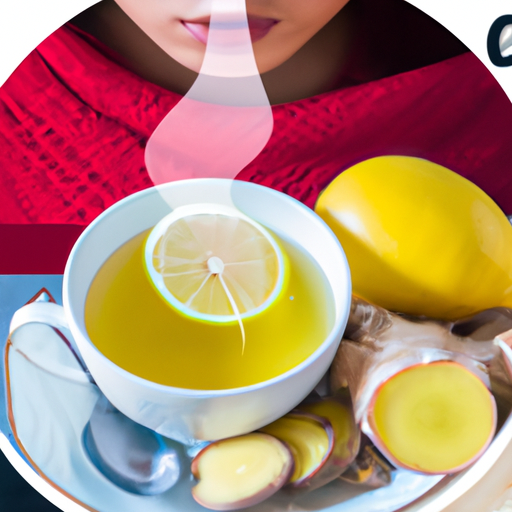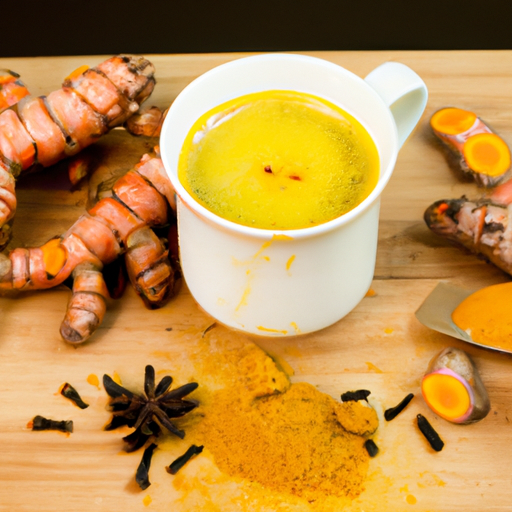I’ve always been curious about mixing turmeric and ginger to improve my health. Have you ever wondered if it’s safe?
After doing some research, I’ve learned that there are some potential benefits to combining these two powerful spices, but there are also some important things to consider before you start mixing them regularly.
Turmeric and ginger are both members of the same family of plants, known as Zingiberaceae, and they share some similarities in terms of their health benefits. Both spices have anti-inflammatory properties, which can be helpful for managing conditions like arthritis, as well as antioxidants, which can help protect your cells from damage caused by free radicals.
However, there are also some differences between the two that are worth noting. Turmeric contains a compound called curcumin, which has been studied extensively for its potential health benefits, while ginger contains compounds called gingerols and shgaols, which are responsible for its unique flavor and aroma.
Key Takeaways
- Mixing turmeric and ginger can provide a powerful combination of anti-inflammatory and antioxidant benefits.
- Recommended dosage is 1-2 teaspoons per day to avoid potential side effects such as stomach upset, flatulence, and diarrhea.
- Precautions should be taken for certain health conditions, such as consulting a doctor before using turmeric and ginger if diabetic or taking blood thinners like warfarin.
- Choose high-quality spices from reputable suppliers and store them properly to preserve potency and flavor.
The Similarities and Differences Between Turmeric and Ginger
You’ll be surprised to learn that turmeric and ginger share some similarities, but they also have some distinct differences.
Both turmeric and ginger are members of the same family, Zingiberaceae, and are popular spices used in cooking around the world. While turmeric is known for its bright yellow-orange color, ginger has a pale yellow color.
Turmeric also has a bitter and earthy taste, while ginger has a spicy and pungent flavor. Turmeric vs ginger also differs in their culinary uses. Turmeric is commonly used in Indian and Middle Eastern cuisine, where it is added to curries, rice dishes and soups. Ginger, on the other hand, is used in a variety of dishes, including stir-fries, marinades, and baked goods. It is also commonly used in beverages, such as ginger tea and ginger ale.
Despite their differences, both spices offer a range of health benefits. The potential benefits of mixing turmeric and ginger are numerous, as both spices have anti-inflammatory and antioxidant properties. By combining the two, you may enhance their health benefits and create a unique and flavorful blend.
The Potential Benefits of Mixing Turmeric and Ginger
As someone who’s interested in natural remedies for inflammation and digestive issues, I’ve been exploring the potential benefits of mixing turmeric and ginger.
Based on my research, I’ve found that this combination may enhance the anti-inflammatory effects and increase the antioxidant power of both herbs.
Additionally, there’s evidence to suggest that mixing turmeric and ginger may improve digestion, making it a promising remedy for those with digestive issues.
Enhanced Anti-Inflammatory Effects
Combining turmeric and ginger can pack a punch in fighting inflammation, making it a powerful duo in the fight against pain and discomfort. The bioavailability factors in turmeric, such as the compound piperine, enhance the absorption of curcumin, the active ingredient in turmeric. Gingerols in ginger aid in reducing inflammation. Together, turmeric and ginger have been shown to have enhanced anti-inflammatory effects and can help alleviate symptoms of conditions such as arthritis, ulcerative colitis, and other inflammatory disorders.
In addition, studies have found that combining turmeric and ginger can also increase antioxidant power. Antioxidants help protect the body from damage caused by free radicals, which are unstable molecules that can cause damage to cells. Turmeric and ginger contain compounds such as curcumin and gingerols, respectively, which have potent antioxidant properties. By combining these two spices, the antioxidant power is increased. This can help protect the body from oxidative stress and reduce the risk of chronic diseases.
Increased Antioxidant Power
Get ready to boost your body’s defenses against free radicals with the increased antioxidant power of these two powerful spices. Not only do turmeric and ginger have anti-inflammatory effects, but they also have impressive antioxidant properties. Antioxidants are substances that help protect your cells from damage caused by free radicals, which are harmful molecules that can lead to oxidative stress and chronic diseases such as cancer and heart disease.
Research has shown that turmeric and ginger can increase the body’s antioxidant capacity and reduce oxidative stress. In fact, a study published in the Journal of Medicinal Food found that supplementing with turmeric extract for 8 weeks significantly increased antioxidant levels in the blood. To reap the benefits of these spices, try incorporating them into your diet through turmeric ginger recipes or by supplementing with turmeric capsules. With their combined anti-inflammatory and antioxidant properties, turmeric and ginger can help support overall health and well-being. This increased antioxidant power may also have potential for improved digestion.
Potential for Improved Digestion
The potential for improved digestion is a promising benefit of incorporating turmeric and ginger into your diet. These two spices have been used for centuries in traditional medicine to alleviate digestive issues and promote gut health.
Here are five ways that turmeric and ginger may improve digestion:
- Reducing inflammation in the gut
- Stimulating the production of digestive enzymes
- Boosting metabolism and promoting fat breakdown
- Relieving nausea and vomiting
- Preventing bloating and gas
One popular way to consume turmeric and ginger together is through turmeric ginger tea. This soothing beverage is easy to make and can be enjoyed hot or cold.
In addition to tea, these spices can be used in a variety of culinary dishes to add flavor and health benefits. However, it’s important to note that while turmeric and ginger may have potential benefits for digestion, there are also some drawbacks to mixing them that should be considered.
Without taking a step, it’s important to address the potential drawbacks of mixing turmeric and ginger.
The Drawbacks of Mixing Turmeric and Ginger
Hey, you might want to reconsider tossing both turmeric and ginger into your smoothie every morning if you want to avoid feeling bloated and gassy. While both herbs have been touted for their potential benefits in improving digestion, their combination may lead to adverse effects on some people.
Possible risks of mixing turmeric and ginger include stomach upset, flatulence, and diarrhea. Proper usage is key to avoiding these drawbacks. It’s recommended to start with small amounts of turmeric and ginger, gradually increasing the dose over time.
Additionally, it’s important to consider individual tolerance and any preexisting medical conditions before consuming these herbs. Consulting with a healthcare professional can also provide guidance on safe usage.
Now, let’s explore how to safely mix turmeric and ginger without experiencing negative side effects.
How to Safely Mix Turmeric and Ginger
When it comes to mixing turmeric and ginger, there are a few things that I keep in mind to ensure that I do so safely.
First and foremost, I pay attention to the recommended dosage for each spice, as taking too much can have negative effects.
Additionally, I take precautions if I have certain health conditions, as some people may need to avoid these spices altogether.
Furthermore, I make sure to choose high-quality spices to ensure that I am getting the most benefit from them.
Overall, with these key takeaways and personal considerations in mind, I can safely incorporate turmeric and ginger into my diet.
Recommended Dosage
To get the most benefits from mixing turmeric and ginger, you should aim to consume no more than 1-2 teaspoons per day. It’s important to note that recommended dosages can vary depending on factors such as age, weight, and overall health.
While turmeric and ginger are generally safe and well-tolerated, consuming excessive amounts can lead to possible side effects such as nausea, diarrhea, and stomach upset.
When incorporating turmeric and ginger into your diet, it’s important to start with small amounts and gradually increase over time. It’s also recommended to consult with a healthcare professional before starting any new supplement or dietary regimen. By following recommended dosages and consulting with a healthcare professional, you can safely and effectively reap the benefits of mixing turmeric and ginger.
In the next section, we’ll discuss precautions for certain health conditions to ensure that everyone can safely incorporate these powerful ingredients into their diet.
Precautions for Certain Health Conditions
Before incorporating these powerful ingredients into your diet, it’s important for you to be aware of certain health conditions that may require precautions. If you’re diabetic, it’s essential to consult your doctor before using turmeric and ginger in your diet. This is because turmeric and ginger may lower blood sugar levels, which can be dangerous if you’re already taking medication to lower your blood sugar.
Your doctor may need to adjust your medication dosage or monitor your blood sugar levels more closely if you decide to incorporate turmeric and ginger into your diet. Additionally, if you’re taking blood thinners such as warfarin, you should also consult your doctor before using turmeric and ginger.
Both turmeric and ginger have antiplatelet effects, which means they can increase the risk of bleeding when taken with blood thinners. Your doctor may need to adjust your medication dosage or monitor your blood clotting time more closely if you decide to use turmeric and ginger in your diet.
With these precautions in mind, it’s possible to safely incorporate turmeric and ginger into your diet for their health benefits. To do so, it’s important to choose high-quality spices that are free from contaminants and adulteration. This will ensure that you’re getting the full benefits of these powerful ingredients without any unwanted side effects.
Choosing High-Quality Spices
Choosing high-quality spices is crucial for ensuring that you receive the full benefits of these powerful ingredients without any unwanted side effects. One of the most important factors to consider when choosing spices is understanding sourcing. It’s important to purchase spices from reputable suppliers who obtain their products from reliable sources. This can help you avoid contaminated spices that may cause harm to your health.
Another important consideration when choosing spices is spice storage. Spices should be stored in a cool, dry place away from direct sunlight. This can help preserve their potency and flavor, ensuring that you get the most out of your spices.
By choosing high-quality spices and properly storing them, you can enjoy the many health benefits that these ingredients have to offer.
As we move forward, it’s important to keep in mind the key takeaways from this section. By understanding sourcing and spice storage, you can ensure that you’re selecting high-quality spices that are safe and effective.
Key Takeaways
Now that you understand the importance of sourcing and proper storage for spices, make sure to always keep these factors in mind when selecting your ingredients to ensure you receive the full benefits of their flavor and health benefits.
However, it’s also important to be aware of possible risks and dosage recommendations when incorporating spices like turmeric and ginger into your diet. While both turmeric and ginger have been shown to offer numerous health benefits, they can also interact with medications and cause adverse effects if consumed in excess.
It’s recommended to consume no more than 2-4 grams of turmeric or 3-4 grams of ginger per day. Additionally, both spices have culinary uses that can enhance the flavor of dishes, but it’s important to use them in moderation and consult a healthcare professional if you have any concerns about their potential interactions with medications.
Personal Considerations
While spices can add depth and complexity to dishes, it’s important to consider personal preferences and dietary restrictions when incorporating them into your cooking. Some people may have a preference for stronger or milder flavors, while others may have certain dietary restrictions that prevent them from using certain spices.
Additionally, it’s important to consider the cultural significance of spices like turmeric and ginger, which have been used in traditional medicine and cuisine for centuries.
Personal preferences can play a significant role in how spices are used in cooking. Some people may prefer the bold, earthy flavor of turmeric, while others may find it too overpowering. Similarly, ginger can add a pungent, spicy kick to dishes, but it may not be to everyone’s taste.
When incorporating spices into your cooking, it’s important to experiment and find what works best for you and your palate. However, it’s also important to be mindful of any dietary restrictions or health concerns that may affect your ability to use certain spices. As such, it’s always a good idea to consult with a healthcare professional before making any significant changes to your diet or lifestyle.
Consultation with a Healthcare Professional
Before incorporating turmeric and ginger into your diet as a health supplement, it’s crucial that you speak with a healthcare professional. This consultation will ensure that any dietary restrictions or health concerns are taken into consideration.
Turmeric and ginger are generally safe for most people when consumed in amounts commonly found in food. However, taking high doses of these spices in supplement form may cause side effects such as gastrointestinal discomfort, dizziness, and nausea.
During your healthcare consultation, your healthcare provider can also provide you with dosage recommendations for turmeric and ginger. The recommended dosage varies based on the individual’s health status and other medications they may be taking.
It’s also important to note that both turmeric and ginger may interact with certain medications. Therefore, it’s important to inform your healthcare provider of any medications you are currently taking, including over-the-counter supplements and herbal remedies.
Frequently Asked Questions
Can mixing turmeric and ginger cause any adverse reactions or side effects?
Possible interactions between turmeric and ginger are rare, and no adverse effects have been reported. The recommended dosage is 1-3 grams per day. Evidence supports their anti-inflammatory and antioxidant properties.
Is it safe to consume turmeric and ginger in large amounts on a regular basis?
Consuming large amounts of turmeric and ginger on a regular basis may have long term effects. It is recommended to follow proper dosage guidelines. Consulting a healthcare provider is advised for personalized recommendations.
Are there any medical conditions that could be worsened by consuming turmeric and ginger together?
As hilarious as the thought of turmeric and ginger wrestling in your stomach may be, it’s worth considering potential risks. Drug interactions and digestive disorders may worsen with their combination. Consult a healthcare provider for guidance.
Is there a specific ratio of turmeric to ginger that should be followed when mixing them?
When it comes to flavor combinations, the Turmeric Ginger ratio will depend on personal preference. However, it’s important to note that both herbs have anti-inflammatory properties and can be beneficial when consumed together.
Can turmeric and ginger be combined with other ingredients for added health benefits?
When it comes to flavor combinations, I love adding turmeric and ginger to my cooking. These ingredients not only add a delicious depth of flavor, but also offer numerous health benefits. Experiment with different cooking techniques to maximize their potential.
Conclusion
In conclusion, mixing turmeric and ginger can be a great way to boost your health and add some flavor to your meals. These two spices have many similarities, such as their anti-inflammatory properties and ability to aid digestion. However, they also have their differences, such as the distinct taste and color of each spice.
While there are many potential benefits to mixing turmeric and ginger, there are also some drawbacks to consider. For example, consuming large amounts of either spice can cause side effects such as stomach upset or blood thinning. It’s important to consult with a healthcare professional before adding these spices to your diet, especially if you’re taking any medications or have any health conditions.
In the end, the proof is in the pudding, or in this case, in the spice mix. Experimenting with turmeric and ginger in your cooking can lead to delicious and nutritious meals. Just remember to use moderation and consult with a professional before making any major changes to your diet.










